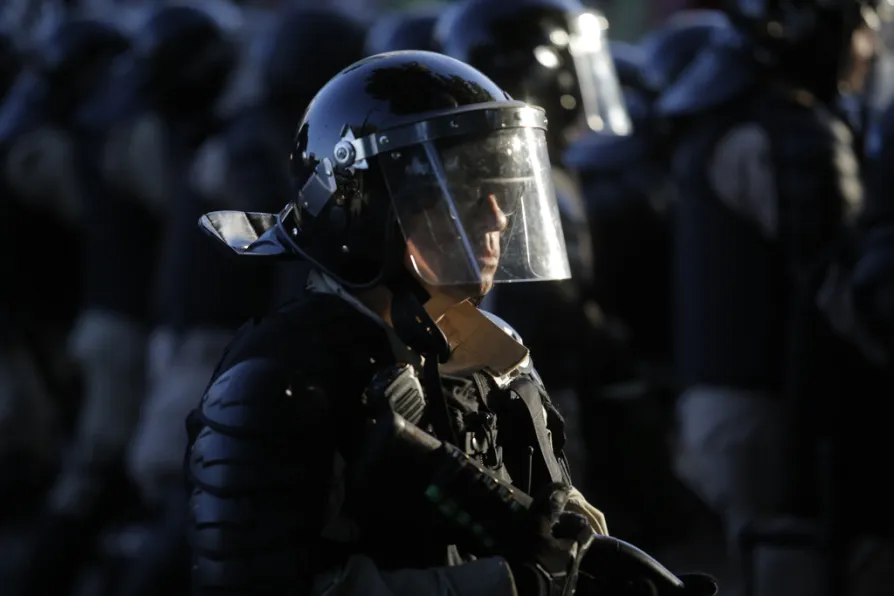Cuba, despite the privations, remains a beacon of sovereignty and resistance to imperialism, writes BERNARD REGAN

 A police officer in riot gear waits outside the the Antonio Vespucio Liberti stadium during clashes with River Plate fans prior the match with Boca Juniors, in Buenos Aires, Argentina, Saturday
A police officer in riot gear waits outside the the Antonio Vespucio Liberti stadium during clashes with River Plate fans prior the match with Boca Juniors, in Buenos Aires, Argentina, Saturday
ON THE same weekend as the Latin America Conference takes place in London, the city of Buenos Aires will be completely locked down as Argentina hosts a meeting of the G20 leaders at the Costa Salguero conference venue on the banks of the River Plate.
Minister of Security Patricia Bullrich is putting over 22,000 heavily armed, uniformed personnel onto the streets in an operation without precedent in the nation’s capital. To beef up the military presence, the government has bought 17 new combat aircraft, four rocket launchers and five armoured cars plus U$17.5 million worth of armaments.
The G20 was extended from a G8 group of countries in 1999. It represents 85 per cent of global GDP, 80 per cent of global investment, 75 per cent of trade and 66 per cent of the world’s population. As is traditional, the host country chooses the themes for the summit and Argentina has plumped for global connectivity, employment and food security.
Nonetheless, the real issues are the escalating trade war between the US and China and the latter’s push to supersede the US as the dominant player in robotics, biotechnology and artificial intelligence. Moreover, in a global economy characterised by financial speculation on an epic scale and the increasing domination of powerful transnational corporations, the G20 leaders lack either the ability or the political will to address the subsequent weakness in systems of representation for their peoples.
During the summit, on November 30 and December 1, there will be a no-fly zone over Buenos Aires, monitored by three mobile radar installations and supported by three US air force AWAC surveillance aircraft. Six Argentinian combat aircraft will be on constant standby, backed up by the presence of US aircraft carriers anchored in the Plate and also across the river in the neighbouring port of Montevideo, Uruguay. And if that were not enough, the world’s leaders are providing their own security in the shape of over 1,500 bodyguards, while Donald Trump will be protected by armoured limousines and helicopters. All road transit in and around the centre of Buenos Aires will be suspended. The main railway termini of Retiro, Once and Constitucion will be closed. There will be no underground trains or buses and both the port and Jorge Newbery airport will also be shut down.
According to Bullrich, these draconian measures are necessary to protect the G20 summit from terrorist attack and, in a crude attempt to generate a climate of fear, two entirely innocent members of Argentina’s tiny Muslim community were arrested and accused of belonging to Hezbollah while a historic anarchist bookshop was raided in dramatic fashion.
In a bizarre intervention, she recommended that port residents should all leave town for a weekend break during the summit. However, the Minister was at pains to emphasise that peaceful protesters had no reason to be afraid of the security forces, a claim that will do little to reassure the organisers of an anti-G20/IMF march, scheduled for November 30.
Since Mauricio Macri became president in December 2015, hardly a week has gone by without a demonstration of some sort against his administration’s ultra-neoliberal policies, many of which have been the subject of vicious attacks by various branches of the state police. Far from condemning police brutality, Minister Bullrich has publicly endorsed their actions and praised them for maintaining law and order.
A recent video of a police officer shooting an unarmed petty criminal in the back and then killing him went viral in Argentina, but, not for the first time, Minister Bullrich did not censor the aggressor but instead commended her for her actions. Only last week, Rodolfo Orellana, a community activist taking part in a peaceful occupation of uninhabited land, was shot dead by law enforcement officers and, some days prior to that, Martin Licata, a left-wing journalist was found hanged in suspicious circumstances after previously receiving death threats.
The criminalisation of protest comes against a backdrop of Argentina’s worst economic crisis since the turn of the century. Roaring inflation has seen a basket of basic goods increase by over 54 per cent year on year. Triggered by a 173 per cent rise in the cost of flour, bread has gone up by 84 per cent, rice by 66 per cent and sunflower oil by 79 per cent. The minimum bus fare is 113 per cent dearer than last year, Buenos Aires metro tickets are 100 per cent more, and scheduled for further increases, while the cost of household gas is up by 218 per cent.

LEE BROWN highlights the latest attempts to undo progressive reforms instated during the presidency of Rafael Correa

FRANCISCO DOMINGUEZ says the US’s bullying conduct in what it considers its backyard is a bid to reassert imperial primacy over a rising China — but it faces huge resistance

JOHN GREEN is fascinated by a very readable account of Britain’s involvement in South America











